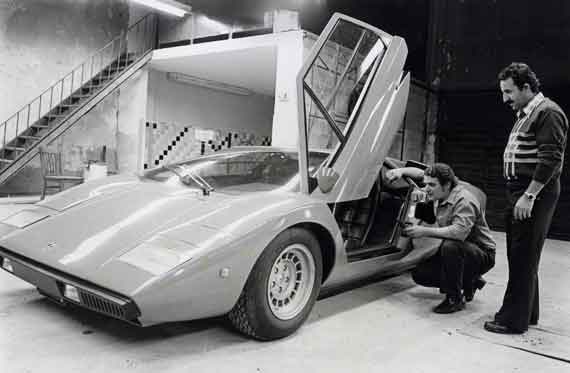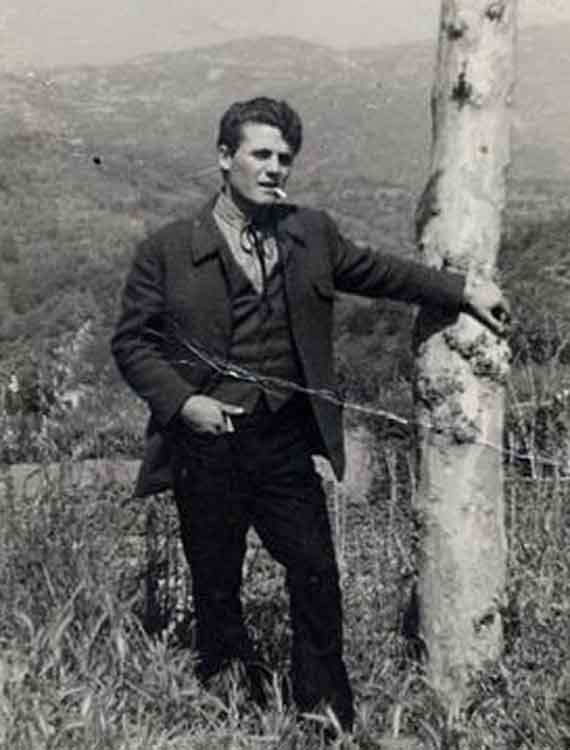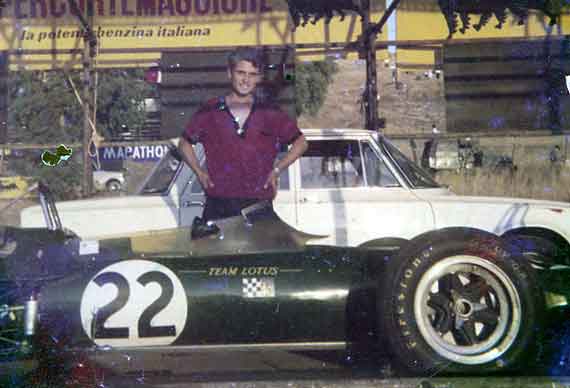
Joe Nastasi with his new partner and the first Lamborghini Countach in the U.S. Nastasi would become involved in the importation of Lamborghinis to the U.S..
By Pete Vack
A need for speed took an impoverished kid from Sicily from bicycles to Lamborghinis.
In the annals of American literature are a series of short novels written by Horatio Alger (1832-1898). Alger’s books usually told a tale of a poor and disadvantaged young man who, by his own strong will, intelligence and enterprise, overcomes great obstacles to eventually win riches and respect, and “builds his own American Dream against the odds.” Thus, in America, when someone who starts with nothing and ends up rich and/or famous, their success is still often referred to as a “Horatio Alger story”.
While there are many such stories in our avocation, few truly reflect the spirit of those now-ancient Horatio Alger stories, and fewer still have met with success in such a remarkable and swift fashion than that of Joseph Nastasi. Born in Sicily, Nastasi dropped out of school in the fifth grade and left home at the age of 14 to be a mechanic. At the age of 21 he emigrated to the U.S., and found employment two days after disembarking. Less than 15 years later, Nastasi had established the only successful Lamborghini grey market lab, so necessary to Lamborghini’s desires to keep their share of the U.S. market. Two years later, still only 37 years old, Nastasi was the official Lamborghini distributor for the East Coast. (Do you really want to know the profit margin on Lamborghinis? Ed.) By 1988, the still-young Joe sold his interest in Lamborghini to Chrysler, and began investing in both real estate and his life-long love of racing Alfa Romeos. Both proved enormously profitable. Says his girlfriend Linda, “When people meet him, they either love him or hate him, but you have to respect him for what he has accomplished with what he was given.”
Joe Nastasi is exactly the kind of character Horatio Alger loved to create. But his story is more interesting than anything Alger could have imagined, and above all, it is real.
Sicilian Childhood
During WWII, as the Allies landed in Sicily on their way to Rome. Joe’s father, who lived in the little town of S. Piero Niceto, a few miles west of the strategically located port of Messina, spent five years in the Army. Joe was born in 1948, into a new and different world than his father. For Joe, the change was most visibly reflected in the growing appearance of automobiles and motorbikes. “I wish my father had been interested in cars, but he wasn’t. He was part of the old Sicily,” recalled Nastasi. Joe’s interest in cars would develop, but the first obstacle was poverty. Joe’s long-time girlfriend Linda found it difficult at times to imagine. “Jow would tell me that they were so poor, for toys they put a stick between two oranges and pushed that around. As a girl who grew up with a room full of Barbies and Easybake ovens, it really put things in prospective.”
Growing up in the port of Malazzo, Nastasi eagerly read every issue of AutoSprint and soon realized he had a gift for mechanics, which fit in very well with his dreams to be a race driver. At fourteen, he left home to become a mechanic at a shop some miles from his home. He learned the basics and learned more, always asking, always trying to improve, and above all, always trying to make things faster.

“I remember this…it was Easter Monday, everyone would get dressed up and go for a picnic in the mountains. I was about seventeen, a real wise guy.“
Moving to Messina, Joe started working at a larger garage, where he modified Fiat 500s, worked on Alfas and Abarths, and his interest in racing became more compelling. Soon, a client with an Alfa Giulietta Sprint told Joe he was on his way to Monza to race his car. Joe asked if he could come along, and the owner told him of course, ‘just be at the Ferry at 10 am the next morning.’ This was Joe’s big chance. “I arrived at the Ferry at 2 am in the morning and waited there until 10. But the guy with the Alfa never came. Finally, I went back home and found out the owner was just joking with me.” It was a lesson learned, but also a clear indication of the extent of Joe’s enthusiasm for cars and racing.
A letter to Enzo
At seventeen Joe opened up a little shop back in his hometown, and made a little bit of money. He was also getting a bit wild, and combined with his need for speed, found himself being chased by the police on far too many occasions. His friends decided to draft a letter for Joe and send it to the Ferrari factory. “Could you please hire this young man as a race driver, test driver, or something???” the letter asked. To his great surprise, Ferrari actually answered the letter, explaining that Joe needed to win some local competitions and get some press. Then, perhaps, Ferrari would consider him. But how to afford a car, much less a racing car, was a problem not addressed by Ferrari. “If I could afford a race car, I wouldn’t have to ask for a job racing one for Ferrari!” though even wild and crazy Joe didn’t reply to the factory in those words.
But he could attend the races, which he did as often as possible. “I’d go to Palermo to watch the cars entered in the Targa Florio, and how well I remember watching our local hero Nino Vacarrella overwhelm the opposition.” Nastasi also attended events at the Enna circuit and it was here that he was photographed standing next to the F2 Lotus of Jim Clark. “Clark didn’t do well in the race, but it was my first exposure to formula racing and very exciting.” A two year required stint in the Navy probably stunted his wild streak. It would have been natural for Joe to become a mechanic while in the service, but “…you know where mechanics in the Navy work? In the boiler room. Forget that! I played trumpet in the band, just biding my time waiting to get out and back into cars and my go karts.”

“There I am with Clark’s Lotus, like I’m ready to get in and drive. Even if it was just a F2 event, it was big time. This was at Enna in 1965.”
Out of the Navy and into marriage, Joe spent his honeymoon driving a Fiat 850 to the Bultaco factory in Spain to buy a new engine to mount on his go-cart. He hid the Butalco engine in the engine compartment of the Fiat and avoided customs duty. His bride, an American citizen, soon persuaded him to go to Brooklyn, New York with her and start a business there. “I said, OK, but we have to think big, make a success, and if not we come back to Sicily.” The business idea succeeded but the marriage did not.
Next week in Part II: Fresh off the boat, Nastasi finds work in New York and applies his talents to Lamborghinis.
life-changing italian mail service: in ’64 my father and i wrote to lamborghini about being their usa agent. when i was at the factory in ’66, sig. lamborghini was quite surprised, saying he’d absolutely never gotten a letter from us. ah well…
Butalco? Perhaps you mean Bultaco, the venerated Spanish motorcycle company?
You are correct. Strangely enough we checked the spelling via google and came up with a page of references for Butalco and didn’t look further. Goes to show that haste makes waste…
That is a neat story so far! A cross between “The Godfather” and Nino Barlini character in “Grand Prix”. I am looking forward to Part 2!
And when you get to that part, don’t forget that Joe’s days in NYC in the ’70’s marked him as one of the best Ferrari/Lamborghini mechanics in the business. All the cars in NYC then that ran well went through Joe’s shop.
The photo with Joe Nastasi and his new partner name is Dimitri Kirsheh who was the owner of the Countach, should have been mentioned in the article.